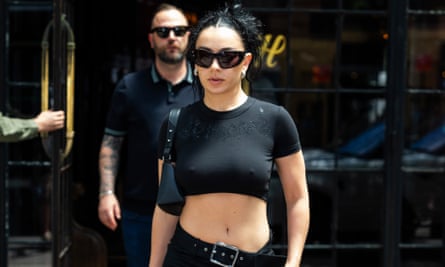How famous is Charli XCX? Even Charli XCX isn’t sure. “I’m famous but not quite / but I’m perfect for the background” she sings on I might say something stupid, the single slow-ish track off her new album, Brat. She’s not wrong; a good portion of the public knows the British singer, if they know her at all, for a top 10 hit from more than 10 years ago. But to a community of largely women, LGBTQ+ people and music critics, she is the biggest pop star in the world, the one everyone’s obsessed with – a persona Charli has leaned into with uncompromising, deadpan bravado: “It’s OK to just admit that you’re jealous of me,” she taunts on Von Dutch, the lead single off an album whose meme-generating cover is literally green with envy. On the deliriously catchy 360, she sings: “360, when you’re in the mirror, you’re just looking at me”, which references internet “it girls” such as Julia Fox – “I’m everywhere, I’m so Julia.”
And this week, at least online, she’s right. Brat is one of the most critically acclaimed albums of the year, now one of the top 20 all time on the site Metacritic (score: 95); her sold-out show/rave in Brooklyn this week drew such online fixations as Julia Fox, Lorde, Matty Healy and his new model fiancee Gabbriette, with tickets reselling for $10,000; many have pointed out that fellow pop artists Camila Cabello and Katy Perry are jacking her sound and lo-fi style, evidence of what Vox’s Rebecca Jennings called the “broader XCXification of culture”. A sickly, striking shade of Brat green spread on social media. The 15-track album of nearly straight club bangers, which contains not a single radio nor CVS-friendly track, is slated to debut at No 4 on the Billboard Hot 200 – by far Charli’s most commercially successful album to date, doing similar numbers to the relatively much more streamed (and doctor’s office friendly) Dua Lipa.
As a longtime fan, this feels both inevitable and surprising, in a time where “authenticity” is prized, lore reigns supreme, and lyrics are meant to be fervently decoded. Brat, as the title suggests, is brash, insouciant, unfiltered, loud, imperious and dripping in irony. It both flaunts and subverts Charli’s coolness, leaning into the ego of a “hot girl” celebrity with frank admissions of jealousy. It is not trying to be likable or relatable or palatable, and yet it is everywhere – an internet moment, a meme, a feeling and the most fun thing to happen to pop all year.
It’s also cutting through the noise during an especially crowded year for female artists, with major releases from Ariana Grande, Beyoncé, Taylor Swift, Billie Eilish, Dua Lipa and other big stars of the level critics for years wondered if Charli would reach. The 31-year-old, born Charlotte Aitchison, has long occupied a unique and fascinating perch in pop music, straddling the underground, where she’s a beloved practitioner of the noisy, abrasive, arguably counter-cultural genre known as hyperpop, and the mainstream. She has a long-standing and loyal cult following for frenetic, brilliantly discordant releases outside of her major label contract – Pop 2, crowdsourced quarantine project How I’m Feeling Now – that have little sonic relation to her biggest chart hits (Boom Clap, the hook on Iggy Azalea’s Fancy.) But with Brat, the polarity of her image seems not just less disparate, but irrelevant. “For years, both Charli and her critics seemed distractingly obsessed with her position – the darling of the underground who either would or could not graduate to Main Pop Girl,” wrote Meaghan Garvey in her Pitchfork review of Brat (rating: 8.6/10). “Then something shifted, and it hardly seemed to matter. She had something they didn’t. She was cool.”
That coolness feels like a direct rejection of a sanitized, often tedious pop landscape of late; along with upstarts Chappell Roan and Sabrina Carpenter, Charli XCX is bringing playful personality back to pop music. While the big pop stars go on stadium tours and tightly guard their image, Charli is hosting highly sought-after raves, harkening back to the messy, scuzzy, paparazzi-flash days of the mid-aughts and indie sleaze. Her lyricism on Brat, by her own description, mimics the type of drunk, unguarded texts you’d send to friends. Where the other pop girls attempt to look perfect, or chafe against spotlight or bleed onto the page, Charli embodies simply having a good time. “You’re all about writing poems / But I’m about throwing parties,” she sings on Girl, so confusing – a kiss-off to a friendship in which rooting for one’s success and demise are indistinct.

Which is not to say that the album isn’t vulnerable; for every track expressing straight hedonism – “365, party girl, bumpin’ that / should we do a little key, should we have a little?” she says on album highlight 365 – there’s a song teasing out something deeper, harder, over an undeniable beat. Sympathy is a Knife is a banger on cutting insecurity in the face of a bigger pop star; So I is a moving tribute to mentor and collaborator Sophie, who died at 34 in 2021, which laments allowing genius to stand in the way of human connection. For an artist who balks at the mandate for authenticity from celebrities, the juxtaposition hits something universal; few artists are going to follow up a song about pondering the possibility of motherhood with one about doing coke and loving it.
All of the tracks invite participation, but not overanalysis; the point is to get lost in it. I’ve tended to think of her music as the sonic equivalent of what cultural critic Max Read once called social media’s Freudian death drive: “our latent instinct toward inorganic oblivion, destruction, self-obliteration”. Total encompassing of song, obliteration by sound – the lyrics, always delivered in autotune, important but not critical, secondary to the power of beautiful cacophony. Pop at its most playful, cutting, and uncomplicatedly fun. As the music critic and pre-eminent Charli scholar Lindsay Zoladz put it: “I believe that most great pop music strikes a precise equilibrium between the smart and the stupid, and few artists working today understand that balance more intuitively than [Charli XCX].” With Brat, she’s everyone’s favorite reference, baby.
Source: theguardian.com


